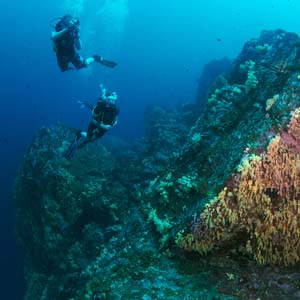Buddy diving is a reliable method used by divers to avoid or survive accidents in or under water. Why is a dive buddy so important? It is important because it is impossible to say that you will never have a problem underwater and if you dive with a buddy, there is somebody there to help or rescue you in the event of an emergency Here are some examples of emergency situations where a buddy’s help can save your life:
•. Out-of-air emergency
•. Buddy can be entangled in net or ropes
•. Buddy can be carried away by the current
•. Equipment failure
•. Illness or medical emergencies
Wicked Diving is focused on creating a good diving pair that is of great benefit to you on your diving adventures. Therefore you should consider what attributes you will look for in a good dive buddy. The diving buddy pair generally consists of two divers with the same level of expertise, knowledge and the same stamina and fitness level so that they can complement each other. However if you are a less than experienced diver it is advised that you dive with a buddy who has logged more dives and is more experienced than you are. This provides a mental support, that if something goes wrong, you will not be on your own. Then you will be able to dive relaxed and confident that someone is there to back you up if you should encounter a problem.
Before your dive, it is important that you and your dive buddy are briefed, to make you fully aware of the conditions in the water, the planned depth and direction of your dive, the air pressure at which the dive will be terminated and ascent started, who will lead and who will follow, the objective of the dive and of procedures and hand signals to follow and use during your dive.
Prior to entering the water, you and your buddy should undertake a buddy check which follows the following steps:
•. BUOYANCY COMPENSATOR – Operate inflator and deflator to ensure that the BC can inflate and deflate, check that the low pressure hose is attached properly to the BC and that you can orally inflate the BC. Also test the dump valves to check that air can be released quickly from the BC.
•. WEIGHT BELT – Check that your buddy is wearing their belt, that they have fastened it with a right hand release and that no excess lengths of the belt are hanging down. If your buddy is wearing an integrated weight system housed within their BC, ensure that you are familiar with the release mechanisms of their weights. The aim is to ensure that you are familiar with the weight system of the diver being checked, and would be able to operate them in an emergency
•. Releases – Locate and check that all of your buddy’s releases are properly secured and you know how to undo them in an emergency. This includes their Velcro waist band and at least two shoulder clips. Many BCs also have a chest and stomach clip. It’s a good idea to touch each clip as you check it and even count each one out loud as you do so. Remember to check the tank strap and clip. You can do this by placing one hand on the bottom of the tank and the other on the first stage regulator and trying to move the tank up and down to see if the strap moves.
•. AIR – check that your buddy’s air supply is turned on at the valve. Smell and taste the air coming out of your buddy’s second stage. The air should be fresh and pure, if there is an unpleasant oily, taste or smell, replace the tank. Ask your buddy to inhale and exhale deeply as you watch their pressure gauge to ensure that the needle doesn’t wobble as they are breathing (an indication of gauge malfunction) also check that they can breathe comfortably through their second stage and “octopus” and that they don’t ‘free-flow’ when purged. Make sure that the ‘octopus’ is attached in the triangle formation between the chin and the base of the ribs, and can be released easily: this ensures easy access for you in the event of an emergency.
•. FINAL – Complete a final check of the diver. Ensure that no hoses are hanging loose, that they are attached to the BC correctly. Check that your buddy has their fins and mask, and any other items (cameras, reels, knife, compass, torch etc.) needed for the dive. Make sure that these are secured to your buddy, or else placed in a spot where they can be handed down once your buddy is in the water. Correct anything else that needs doing and talk to your buddy, ensure that they feel comfortable, confident and happy for the dive to proceed.
Diving is enjoyed in the beautiful yet silent underwater world, therefore dive buddies must communicate by efficient and clear non-audible signals. You should pay attention during your dive briefing to ensure that you understand all of the hand signals you may be presented with during your dive. If you choose to you may also use submersible writing slates to communicate with your buddy underwater.
 Another important point is that you and your dive buddy should regularly check each other’s gauges and always keep an eye on one another. This will keep your safety level high when diving. If one feels unwell, the other should take some steps to make them feel better or help their buddy out of the water in a safe and calm manner. Also stay close to your buddy for the duration of the dive, maintaining a distance that can be covered within seconds should an emergency arise. You may also be required to help your buddy out of dangerous situations, if they become entangled or run out of air.
Another important point is that you and your dive buddy should regularly check each other’s gauges and always keep an eye on one another. This will keep your safety level high when diving. If one feels unwell, the other should take some steps to make them feel better or help their buddy out of the water in a safe and calm manner. Also stay close to your buddy for the duration of the dive, maintaining a distance that can be covered within seconds should an emergency arise. You may also be required to help your buddy out of dangerous situations, if they become entangled or run out of air.If you should become separated from your buddy you should be able to follow the usual procedures to re-establish contact by staying in the same place for one minute, then if that fails safely returning to the surface to re-establish contact at the surface. These procedures should be discussed between you and your buddy during your pre-dive briefing.
The buddy system is the situation which occurs when two divers of similar interest and equal experience and ability share a dive, continuously monitoring each other throughout the entry, the dive and the exit, and remaining within such distance that they could render immediate assistance to each other if required.
Bob Halstead, Line dancing and the buddy system
To reiterate Why is a dive buddy so important? – Although the principal reason for using the buddy system is the minimisation of the possible risks in diving, the sharing of diving experiences and the enjoyment of being together with a friend, family member, or even a passionate fellow diver whilst diving is one of the main reasons why so many people love the sport of scuba diving!
-Similan Diving


0 comments:
Post a Comment